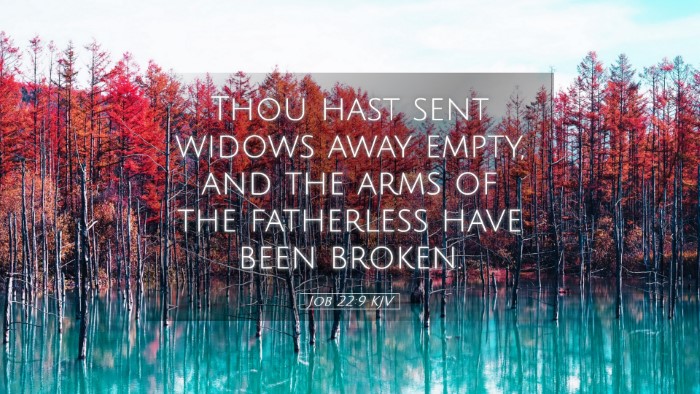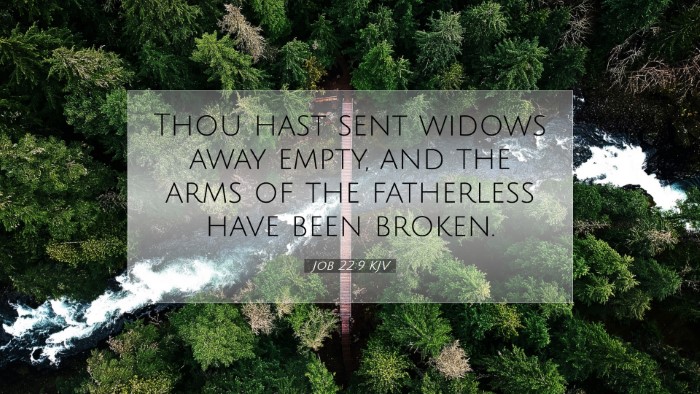Old Testament
Genesis Exodus Leviticus Numbers Deuteronomy Joshua Judges Ruth 1 Samuel 2 Samuel 1 Kings 2 Kings 1 Chronicles 2 Chronicles Ezra Nehemiah Esther Job Psalms Proverbs Ecclesiastes Song of Solomon Isaiah Jeremiah Lamentations Ezekiel Daniel Hosea Joel Amos Obadiah Jonah Micah Nahum Habakkuk Zephaniah Haggai Zechariah MalachiJob 22:9
Job 22:9 KJV
Thou hast sent widows away empty, and the arms of the fatherless have been broken.
Job 22:9 Bible Commentary
Commentary on Job 22:9
Introduction
This verse, found in the book of Job, is part of the discourse by Eliphaz the Temanite, one of Job's three friends. In this chapter, Eliphaz seeks to confront Job with accusations of sin and hypocrisy, attempting to explain the suffering Job faces as a consequence of his wrongdoings. Job 22:9 states:
"Thou hast sent widows away empty, and the arms of the fatherless have been broken."
This verse serves as a critical element in understanding the themes of justice, retribution, and the character of God in Job's narrative. The insights from various public domain commentaries together will illuminate the spiritual and theological significance of this verse.
Verse Analysis
Textual Context
In the greater context of the book, Job has endured immense suffering, losing his wealth, health, and family. His friends, like Eliphaz, attribute this suffering to divine punishment for sin. Eliphaz's charge of Job's treatment towards the vulnerable stems from a misinterpretation of Job's character, showcasing the problematic nature of oversimplified theologies that attribute suffering directly to personal sin.
Matthew Henry’s Commentary
Matthew Henry notes that the accusation placed upon Job by Eliphaz relates to his treatment of widows and orphans. Henry articulates that true religion involves care for the downtrodden, suggesting that Eliphaz's claims are an indictment of Job's character and actions:
- Impact of Social Ethics: Henry emphasizes the importance of social justice, where negligence towards the fatherless and widows is equated to amoral behavior.
- The Suffering Righteous: He posits that Job's plight should lead to understanding the depth of his righteousness, contrary to Eliphaz’s allegations.
- God’s Justice: Henry reflects on God’s ultimate judgment, reminding readers that God's justice transcends earthly perceptions of retributive punishment.
Albert Barnes’ Commentary
Albert Barnes explores the implications of the accusation, clarifying the gravity of sending away widows and orphans empty-handed:
- Sociocultural Responsibilities: Barnes stresses the cultural responsibility clearly laid upon individuals to care for those in need, as articulated in the Mosaic Law.
- Character Defamation: Barnes highlights that Eliphaz’s accusation is a slanderous misrepresentation of Job’s character, as Job sought to stand for the oppressed.
- Divine Accountability: Barnes indicates that Job’s suffering is not an automatic result of sin, pointing to a more profound mystery surrounding suffering and divine providence.
Adam Clarke’s Commentary
Adam Clarke takes a theological approach, examining the nature of God and His justice:
- God’s Omniscience: Clarke draws attention to the incomprehensible wisdom of God, suggesting that Eliphaz's limited view fails to apprehend God's larger plan.
- Misinterpretation of Job’s Piety: According to Clarke, Eliphaz misinterprets Job's lamentations and prayers, viewing them through a lens of accusation rather than understanding.
- Hope amidst Despair: He further articulates that even amidst these accusations, Job clings to faith—the hope of vindication in God's timing.
Theological Themes
Moral and Social Responsibility
At the heart of Job 22:9 is the theme of moral responsibility. The care of the vulnerable is not merely a social duty but a reflection of one's relationship with God. Throughout scripture, God consistently identifies Himself with the fatherless and widows (Exodus 22:22-24; Deuteronomy 10:18). This raises essential questions concerning the intersection of faith and works:
- How does one’s faith manifest in action towards the disenfranchised?
- What accountability do believers carry regarding social justice and advocacy?
Retributive vs. Relational Theology
The retributive theology espoused by Eliphaz—that suffering is always a punishment for sin—stands in stark contrast to a relational understanding of divine justice. The book of Job challenges believers to consider a more nuanced approach to suffering, where God’s ways and thoughts are higher than our own (Isaiah 55:8-9). Such a view allows for the complexity of the human experience, recognizing that:
- Suffering does not inherently indicate divine displeasure.
- God's presence can be profoundly felt in the midst of undeserved suffering.
The Character of God
Central to the dialogue in Job is the character of God. Questions arise regarding God’s justice and goodness amidst human suffering. This verse urges readers to reconsider how we view God's actions:
- Do we consider God to be just if He allows the righteous to suffer?
- How do God's attributes like mercy, justice, and love coexist in times of personal calamity?
Practical Application
In an application of Job 22:9 for modern believers, several insights emerge for pastoral care, community involvement, and personal reflection:
- Active Compassion: Believers are called to engage actively in the lives of the vulnerable, ensuring their needs are met.
- Understanding Suffering: This verse invites reflection on our understanding of suffering—encouraging us to avoid simplistic conclusions about suffering and divine judgment.
- Community Accountability: The church community has a role in holding each other accountable to care for the marginalized, embodying Christ’s love in actionable ways.
Conclusion
Job 22:9 provides a poignant reflection on the necessity of compassion towards the marginalized and those in need. By synthesizing insights from esteemed commentaries by Matthew Henry, Albert Barnes, and Adam Clarke, it becomes clear that this verse serves not only as a rebuke to Job but also as a broader call to heed God's expectations regarding social ethics.
As theological discourse continues to unpack the complexities of the human experience in light of suffering, this verse remains a vital reminder of our responsibility both to God and to the world around us.


